State council outlines 2023 issues
by Jane McClure
Affordable and accessible housing, reforms for working people with disabilities, and dealing with the direct care crisis are among issues the Minnesota Council on Disability (MCD) will champion during the 2023 legislative session.


Council members, staff and self-advocates presented the 2023 legislative agenda, outlined priorities and discussed issues with state lawmakers during the annual legislative forum December 16. The forum was held virtually, with hundreds attending. A recording will be posted on the state council website in January.
More than 30 state lawmakers indicated they would attend the forum. But one key change this year was that several self-advocates and state council members took a lead in explaining issues, rather than simply listening to state lawmakers.
Many of the stories were moving. A man outlined how his parents help with personal care needs and his current living situation, and he wonders what he will do when they are gone. A parent described trying to save her child with a rare disease and hitting obstacle after obstacle with medical care and insurance.
A young man who uses a wheelchair told of finding out how truly limited his housing options are, especially when a lack of roll-in showers is seen. The high cost of hearing aids and the difficulty in paying for them were explained. Seeking and retaining public and private employment, while balancing healthcare needs and strict income limits were hurdles several people explained in detail.
Trevor Turner, director of public policy for the state council, outlined the three pillars of priorities that will be focused upon when state lawmakers convene January 3. Each pillar is built on related legislative initiatives.
One pillar is to increase disability representation in state government. Tied to that are efforts to work toward more state employment and retention of employees with disabilities.
As it did in 2022, the council is also again seeking support for capacitybuilding as its budget and employee ranks have remained relatively flat despite growing demands for service. The Minnesota Council on Disability will request a capacity building budget increase of $750,000 in FY2024 and then $1,247,000 each fiscal year afterwards. This is on top of the current budget of $1,038,000, resulting in a total yearly budget of $2,285,000.
A state government function the council will be supporting in 2023 is ongoing funding for the recently established Rare Disease Advisory Council. The council is supposed to sunset after fiscal year 2023; advocates would like its work to continue.
The second pillar centers on improving the lives of Minnesotans with disabilities, with one focus being increasing personal care attendant (PCA) pay and addressing the dire home care worker shortage. Related to that is to change regulations on PCA driving, so that clients can be driven to
New 16-bed mental health center eyed for West St. Paul location
 by Kevin D. Hendricks West St. Paul Reader
by Kevin D. Hendricks West St. Paul Reader
After a hearing packed by almost 100 people December 13, the West St. Paul City Council unanimously approved a new mental health crisis center. The project goes on to the Dakota County Board.
Thirty-four people spoke during the public hearing. A majority of the crowd— roughly four out of five—supported the crisis center, speaking in favor of mental health services. A minority of residents spoke in opposition, citing safety concerns.
Dakota County and Guild Services proposed a 16,000-square-foot building with 16 beds to house intensive residential treatment, crisis services, and a “welcoming place to go” 24/7 staffed by the Dakota County crisis team.
The proposed location is the northeast corner of the Dakota County’s Northern Service Center property along Livingston Avenue.
Nearby residents have voiced concerns at past public meetings, including the November 15 Planning Commission, a neighborhood meeting attended by more than 80 people, meetings with the police chief, and more.
Complaints focused on security concerns and a lack of community notification. “Last week there was disclosed a client of Guild that seemed pretty dangerous to the public. I’m concerned our biggest nightmare would
come true that something like that comes into our backyard and the first responders are our children,” said John Hansen.
“The suggestion that asking questions about this facility and program constitutes opposition to expanded mental health programs and facilities is misplaced and has a chilling and intimidating effect on reasonable discussion,” said former City Council Member John Bellows
“You are going to make us make accommodations for our entire life. The staff at Guild, the staff at the county, they get to go home. We won’t ever get to stop worrying about when something will happen. It might not be for years, but some time it will happen,” said Britt Drake.
Other residents and community members spoke in favor of the crisis center. “Three police chiefs are on record, including our Chief Sturgeon, saying they are not concerned about this facility. So I’m personally really proud to welcome this facility to town,” said former City Council Member Aaron Van Moorlehem.
“People who are in treatment for mental health deserve to know they are valuable people. We value them. We welcome them. And we will support them in their recovery. … Let’s not let the reputation of our city reflect those few people who turn their back on those in need but instead reflect the majority of our residents who really care,”
CENTER To page 4
Goodbye to you, 2022 - our annual look back at last year

Time flies! Another year is in the books, so here is our annual look back at what Access Press covered in 2022.
January 2022
The year began with optimism about the 2022 Minnesota Legislature, especially from disability organizations and institutions seeking state bonding. One set of asks came from the Minnesota State Academy for the Deaf and the State Academy for the Blind. Requests included support for dormitory renovations and improvements to older buildings. But hopes of a bonding bill faded by the session’s end.
As of January 1, St. Paul-based Altair Accountable Care Organization (ACO) became an independent 501(c)(3) organization. Altair ACO began in 2013 with six home and community-based providers who joined together to share best practices, resources and information to provide better outcomes at less cost for clients. The collaborative grew to 14 providers supporting more than 20,000 Minnesota individuals with disabilities who have waivered services.
Disabled students at Hamline University were raising issues about access and equity, with some students transferring to other schools.
February 2022
Electronic visit verification was being rolled out, but not without concerns

about the federally mandated system. The system, intended to curb waste and fraud, was seen as a potential detriment to hiring as employees might object to being tracked.
The 2022 Minnesota Legislature was being asked to address the dire staff shortages Minnesotans with disabilities faced. A variety of solutions were proposed for state lawmakers to consider.
The Minnesota Council on Disability was among groups seeking additional state resources at the capitol. Council leaders pointed out that funding and staffing hadn’t kept up with demand for services.
Minnesota Department of Health Commissioner Kris Ehresman was stepping down. Several state lawmakers also announced that the 2022 session would be their last, eventually leading to a mass exodus at session’s end.
ProAct program participant James Gelking was honored for 40 years with the nonprofit. He had many programs and activities under his belt, and enjoyed enrichment program classes and activities.
March 2022
City leaders throughout Minnesota continued to debate about drive-through services such as coffee shops, pharmacies and fast food spots. A St. Paul Starbucks had removed a drive-through that had caused traffic tie-ups. Minneapolis officials were battling with the prospective operators of two shuttered fast-food restaurants over their quest to bring back drive-through service. While pedestrian advocates applauded the measures to cut back on drive-through services, people with disabilities who often rely on drivethrough services for basic needs were worried.
Making disability community voices
Rendering of a 16-bed mental health center planned in West St. Paul. It will be owned by Dakota County.
NONPROFIT ORG. U.S. POSTAGE PAID TWIN CITIES, MN PERMIT NO. 4766
COUNTY
DAKOTA
Volume 34, Number 1 WWW.ACCESSPRESS.ORG January 2023
STATE COUNCIL To page 4
YEAR IN REVIEW To page 3 Visit our new website accesspress.org esolve to check out the newly redesigned Access Press website! Let us know what you think! R
Tim Benjamin
The December 6 announcement of a record-breaking, $17.8 billion state surplus means the chase is on at the state capitol. When the Minnesota Legislature convenes January 3, lots of great ideas for spending at least part of the surplus are going to be brought forward.
Part of the surplus is $9.3 billion left on the table at the end of the 2022 session. We remember all too well how that ended for us and for so many of our disability-focused bills. We had a lot of needs left waiting.
One glaring need is that of addressing the direct care catastrophe in our state, and to demand wages that can support our workers. Recent media reports about people with disabilities who have faced amputation due to poor care or lack of care are highlighting an issue Access Press has focused on for years. We wonder how many have died due to poor care or no care at all?
You cannot have care without adequately paid staff. The Best Life Alliance is back this session, calling for long-term, sustainable adjustments to the Disability Waiver Rate System (DWRS). Changes the alliance seeks would update the way disability waiver rates are set to reflect current economic conditions and support providers in raising the wages of their direct support and supervisor staff in an effort to stand up and stabilize disability supportive services.
One key change would be to change the date of data used for current DWRS adjustments. Current law determines adjustments to the DWRS based on data that is 30 months and one day old. This results in adjustments that are based on economic conditions from three years ago. As we all know that data has
greatly changed -- especially with our recent inflation trends. Best Life Alliance proposes using the most currently available data from the Bureau of Labor Statistics when adjusting the DWRS.
Another important change would be to fully fund the “competitive workforce factor” based on the most recent Department of Human Services analysis and allow for automatic adjustments every two years.
The 2019 Minnesota Legislature created the factor in 2019 to support higher wages for direct support professionals, but it hasn’t been adjusted since its creation. The alliance proposes updating the factor based on recommendations from DHS beginning in 2024 and 2025 and every two years after that.
Another ask is in move up the November 2024 increase in January 2024 and create another increase to January
HISTORY NOTE
2025 and every two years after that: The next scheduled rate adjustment for the DWRS doesn’t start until November 2024. It is to be implemented on a rolling basis, as individuals’ service authorizations are renewed. This means many clients will not see any rate adjustments until 2025. The alliance proposes moving the next adjustment up to January of 2024, and allowing for an additional adjustment in 2025 and every two years after that.
Providers simply cannot wait this long for adjusted reimbursement rates to support increasing wages for direct support professionals,” the alliance stated.
One adjustment to the DWRS would ensure that supervisor wages don’t fall below the direct support professional wage, by setting a floor for supervisor pay.
Other more technical changes are also badly needed. One would be to


remove unit-based respite from DWRS. Currently, respite provided for less than 10 hours a day is billed in 15-minute increments. It is subject to the DWRS framework rate versus the daily option which is a market rate service. Making unit-based respite a market-rate service would be in alignment with how daily respite is currently operating. That would eliminate inconsistency and provide greater access to the service.
Another would be to raise what are called employment exploration standard occupant codes to align with employment development. The codes are used to form the base wage for the employment exploitation service, which is meant to keep the service someone accesses when they are ready to move into a competitive, community-based job. None of this is rocket science. But it is long overdue in being addressed. And the Best Life Alliance cannot do it alone.
We know this kind of spending will have “tails” that will go on for years. We know it could get set aside to meet onetime wants and needs.
But lives are at stake here. Wouldn’t it be more cost-effective over time to keep people in their homes and home communities, instead of forcing people into group homes and nursing homes? Wouldn’t it be more cost-effective to provide quality care up front, rather than paying for more costly care later?
Everyone who cares about equitable, living wages and quality of care needs to speak out on this.
Dubious causes and cures were part of speech disorder treatment
Many of us live with speech disorders, often in combination with another disability. Therapies and assistance have greatly changed over the years, as has the stigma around speech disorders.
Speech disorders can have many origins and can include stuttering, apraxia and dysarthria. The disorders can have many possible causes. People on the autism spectrum may have speech disorders. Or the disorders can be caused by brain injuries, muscle weaknesses, hearing loss or degenerative diseases. Some people can successfully counter speech disorders through therapy. Others live with the disorders and must find ways to adapt.
Speech disorders in children can be of special concern, as communication is such an important part of child development. Speech disorders can also hold people back from jobs and other opportunities.
Years ago, speech disorders or “speech impediments” were not well understood. People were labeled as “dumb” and many doors were closed to them.
Newspapers were filled with details of
dubious “miracle” cures, often promoted by traveling salesmen who may or may not have been doctors despite claiming the medical title.
It is interesting to note how the words “stammer” and stutter” were used interchangeably years ago. Today we’d consider “stammer” to be more of a British term for what people in North America refer to as stuttering.
Looking back 110 years ago, larger cities had special schools for students with speech disorders. Those schools and camps were offered for children who stuttered. The Duke School for Stammerers offered a summer school and recreational camp at Lake Minnetonka, as well as year-round classes. The school had opened in 1893 and offered instruction for the correction of “stuttering, stammering and other speech impediments.”
Urban school districts such as Minneapolis and St. Paul had classrooms or entire schools set aside for children with speech disorders. Most students would attend the special schools as well as
their neighborhood schools.
One 1913 Star Tribune article described Minneapolis’ two schools, Greeley and Hawthorne, for “stutterers and stammerers.” The schools included pupils who lisped or had other speech disorders, as well as students who were deaf. Students who had learned how to speak without stuttering were held up as examples in the articles, reading aloud for newspaper reporters.
Along with the usual steps of teaching children to speak slowly and use proper tongue positioning, one therapy was for children to engage in outdoor sports and games. Such activities were seen as making children less self-conscious and worried about what impressions they would give people.
In contrast, too much time spent at the movie theater was blamed by some teachers. “Movies are especially pernicious for their effects, it is said. The subjects are usually of the excitable sort, especially injurious to the nerves of stammerers. The light and wavering of the film have a bad
effect on the eyes and consequently on the nerves. The show keeps the child out when he should be sleeping. The air usually is bad, and the associations often harmful.”
Children who stuttered were said to be ‘thrilled” by the excitement on the movie screen, which compounded problems caused by “diseased” nerves. Teachers also blamed “dime novels “ which were often lurid stories in cheap books.
Another newspaper account blamed cigarettes for causing stuttering in children. Students at the Minneapolis schools were banned from drinking coffee and tea, and told to go easy on the candy.
It would be interesting to know how many of the 1913 students fared as they grew up, and what they would think of more conventional therapies today.
The History Note is a monthly column produced in cooperation with the Minnesota Governor’s Council on Developmental Disabilities. Past History Notes and other disability history may be found at www.mnddc.org
EDITORIAL: Editorial submissions and news releases on topics of interest to persons with disabilities, or persons serving those with disabilities, are welcomed. We reserve the right to edit all submissions. Editorial material and advertising do not necessarily reflect the view of the editor/publisher of Access Press.
DEADLINE: 15th of each month.
CIRCULATION/DISTRIBUTION: Distributed the 1st of each month through more than 200 locations statewide. Approximately 750 copies are mailed to individuals, including political, business, institutional and civic leaders.
SUBSCRIPTION: Free and accessible to anyone in MInnesota, visit www.accesspress.org to subscribe.
ABOUT ACCESS PRESS: A monthly newspaper published for persons with disabilities by Access Press, Ltd. POSTMASTER: Send address changes to Access Press, PO Box 40006, Industrial Station, St. Paul, MN 551048006
INQUIRIES AND ADDRESS CHANGES should be directed to: Access Press, PO Box 40006, Industrial Station, St. Paul, MN 55104-8006; 651-644-2133; email: access@ accesspress.org Website: accesspress.org

January 2023 Volume 34, Number 1 Pg 2
Executive Director ....................................................................................................................................................................... Holly Anderson Editor Jane McClure Board of Directors .......................................... Mohamed Alfash, Tim S. Benjamin, John Clark, Adrienne Coatley, Mark Daly, Brendan Downes, Erica Fair, Catherine Hunter, Jane Larson, Michaela Powers, Ann Roscoe, Kay Willshire (Chair) Cartoonist Scott Adams Production In-Fin Tuan Digital Production Tricia Donovan Website: accesspress.org email: access@accesspress.org phone: 651-644-2133 Co-Founder/Publisher Wm. A. Smith, Jr. (1990-96) Co-Founder/Publisher/ Editor-in-Chief Charles F. Smith (1990-2001) Editor-in-Chief/Executive Director Tim Benjamin (2001-2020) The time is now to make changes to the Disability Waiver Rate System EDITORIAL None of this is rocket science. But it is long overdue in being addressed. And the Best Life Alliance cannot do it alone. We know this kind of spending will have "tails: that will go on for years. We know it could get aside to meet onetime wants and needs.
heard at the Minnesota capitol continued to be a virtual process. Two of the regular session’s largest rallies, Disability Day at the Capitol and Mental Health Day on the Hill, were held virtually. Those at both rallies called for state lawmakers to spend some of the budget surplus on disability needs. At both gatherings needs were voiced for supportive and accessible housing of all types.
Chrestomathy celebrated its new facility in Minnetonka.
April 2022
One highlight of the Beijing Paralympics was a device made in Minnesota. Snowboarder and medalist Mike Schultz got to see other athletes using his inventions, the Moto Knee and Versa Foot. He is the founder and owner of St. Augusta-based BioDapt.

Many people with disabilities lack job opportunities and have had their housing upended because of Minnesota’s dire worker shortage. Service providers and allies were hoping that their needs will be addressed. More than 1,000 people from around the state and from local disability service organizations recently took part in rallying for legislative support during Disability Services Day.
A disability jobs creation program, poised to launch this summer, faced an uncertain future with the loss of its proposed space. Highland Popcorn was to announce a partnership with University of St. Thomas in St. Paul to use part of a campus building. But Highland Popcorn was informed that the business relationship was terminated.
Longtime WACOSA leader Steve Howard announced his retirement plans.
May 2022
The legislative session drew to a close with much uncertainty over many disability-focused bills. One bright spot was when Gov. Tim Walz signed a bill funding ALS research, honoring Sen. Dave Tomassoni (I-Chisolm), who was
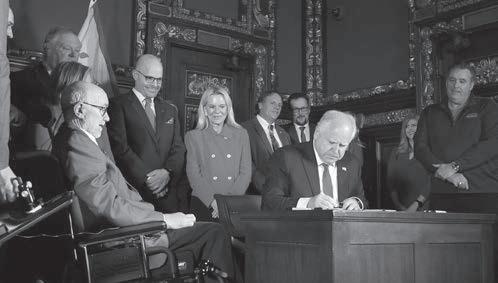
New
Fifty-seven organizations will receive more than $7 million in Live Well At Home grants from the Minnesota Department of Human Services (DHS) to support aging Minnesotans. The goal is to help older adults stay healthy, independent and involved in their communities.
“Most people want to live at home as long as possible,” said Human Services Commissioner Jodi Harpstead. “Supporting older Minnesotans to stay in their homes can lead to better health and quality of life. It can also ease pressure on residential care facilities that are struggling to find enough staff.”
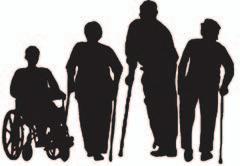
Here is a list of grants by location, grouped by region.
Central Minnesota Aging Services, Cloud, $198,000. Community health workers will serve as front-line liaisons between health care, social services and community members, focusing on family caregivers and rural members of Latino and East African communities.
Assumption Community Faith Services, Cold Spring, $108,000. The program will increase accessibility and support to older adults in Stearns County and the St. Cloud area, working with the Tri-Community Living at Home Block Nurse Program.
Paynesville Area Living at Home Block Nurse Program, Paynesville, $55,000. Services including accessible transportation, homemaking assistance and caregiver support will support older residents of Belgrade, Brooten and the Paynesville area.
CARE – Community Action Respecting Elders, Foley, $60,000. Services will help Benton County residents in their community, reduce longterm care placement and decrease reliance on state programs.
Frazee Neighbor to Neighbor, Frazee, $57,000. The program helps keep residents out of nursing homes through services including transportation, Meals on Wheels, senior socials, household repair services, home modifications, health and exercise classes.
PARTNERS, Rothsay, $40,000. People Around Rothsay That Need Area Routine Services helps residents remain in their homes through exercise programs, blood
battling the disease.
The care crisis, the health care worker shortage and rising rates of worker burnout, were documented in a Minnesota Department of Health survey and report, Minnesota’s Health Care Workforce: Pandemic-Provoked Workforce Exits, Burnout and Shortages.
pressure screenings, foot care and other strategies. The program serves the Rothsay, Carlisle and Foxhome areas.
West Central Minnesota Communities Action, Elbow Lake, $275,000. Chore services and Ready Ride Transportation continue for aging residents, serving more than 7,000 households with programs including energy assistance, weatherization and home modification.
Granite Falls Living at Home Block Nurse Program, Granite Falls, $58,000. Volunteers serve seniors, people living with chronic conditions and caregivers in the Montevideo, Dawson and Madison areas.
Habitat for Humanity, Douglas County and Alexandria, $111,000. The Aging in Place program for low-income older homeowners will expand, to help people remain in their homes through low-cost, high-impact home safety and access modifications.
Northern Minnesota
Lighthouse Center for Vital Living, Duluth, $350,000. A donated building will become into an assistive technology center for older adults, adding to Lighthouse’s longterm services and supports.
Legal Aid Service of Northeast Minnesota, Duluth, $93,000. Attorneys will serve on the health care teams of rural American Indian elders, helping address social factors impacting the health of American Indian elders and their caregivers.
Volunteer Services of Carlton County, Carlton County, $196,000. The Communities Called to Care Program will restart services closed during the pandemic, including assisted transportation and DayBreak Group Respite. The program will also enhance other services such as caregiver counseling.
Care Partners of Cook County, Grand Marais, $45,000. Funding will support services include specialized medical care, care coordination and caregiver support for people with serious illnesses.
Access North, Hibbing, $122,000.
Assistance helps homeowners return safely to their homes after a hospital, rehab or nursing facility stay with physical improvements.
Elder Circle 2, Grand Rapids, $68,000.
It highlighted the effect of the COVID-19 pandemic on most of the licensed health care workforce in Minnesota. The report drew on a survey given at the time of license renewal for “frontline” providers including physician assistants, respiratory therapists, pharmacists, nurses, physicians, mental health providers and others.
The report raised red flags in Greater Minnesota, where many workers indicated that they wish to retire in a few years.

The nonprofit Young Dance inspired a book about a dancer with disabilities.
June 2022
PACER Center cofounder Paula Goldberg was remembered after her death as a compassionate yet tenacious champion for children with disabilities. She played a key role not only in building PACER Center, but in the national parent advocacy movement.
Excitement was already building for the 2026 Special Olympics. It was a proud day for athletes with disabilities as the announcement was made, led by Special Olympics Minnesota. The games will bring together athletes, coaches and fans who will showcase inclusion, competition and how to unify the world through sport. In June 2026, the Twin Cities will host as many as 4,000 athletes, 10,000 volunteers, 1,500 coaches and 75,000 fans from all 50 states, parts of Canada and the Caribbean.
Special Olympics is the world’s largest sports organization for children and adults with intellectual and physical disabilities, providing year-round training and activities to 5 million participants in 172 countries.
Special Olympics Minnesota sent a record 145 athletes to the 2022 Special Olympics USA Games, held in Orlando. During the closing ceremonies, the torch was passed literally and figuratively to Minnesota.
Central Minnesota’s Independent Lifestyles celebrated 25 years of service.
Minnesota’s legislative session had ended with chaos and disappointment, as many key bills weren’t passed at the end. Mental health fared well but other focus areas did not. Hopes were slim to none for a special session.
July 2022
Accessible Adventures Await! was the theme of the annual Americans with Disabilities Act (ADA) celebration in July. The virtual celebration highlighted
Funds will provide affordable transportation to help older adults engage with friends, family and community in Itasca County, with a focus on transportation needs.
Something Cool Inc., McGregor, $44,000. Three initiatives focus on veterans, American Indian elders and adults with disabilities, with chore services, social opportunities and work with youth to provide outdoor activities.
Angels, McGregor, $41,000. A raisedbed vegetable and flower garden offer easy access for seniors living with disabilities. Volunteers will provide transportation to the garden and assistance will be provided for people with hearing loss.
Red Lake Reservation Housing Authority, Red Lake, $101,000. The Enhanced Modernization Program will assist 10 homeowners who need accessibility and health- and safety-related modifications to their homes. Fifty Tribal elders will receive personal emergency response systems.
Northwoods Caregivers, Bemidji, $260,000. Expanded home and community-based services and caregiver support will focus on the Red Lake Nation, White Earth Nation, Leech Lake Band of Ojibwe, Bois Forte Band of Chippewa, and Lake of the Woods County.
Living at Home of the Park Rapids Area, Park Rapids, $107,000. Services include local and long-distance transportation, light housekeeping, repair services, friendly visits and phone calls, ramp building, respite care, youth mentoring and dementia education and awareness.
Horizon Family Services, McIntosh, $66,000. A pilot program in Polk and Norman counties will offer Lyft ridesharing.
Stephen Living At Home, Stephen, $40,000. Essential services will expand, including transportation, meal delivery, friendly visits, phone reassurance, medication reminders, caregiver support and homemaking.
Middle River Thief Lake Living Well at Home, Marshall County, $27,000. Services will expand for older adults and veterans to enable them to remain in their homes and integrate medical and home and community-based services to better manage
chronic illnesses.
Tri-Community Living At Home Block Nurse Program, Newfolden, $60,000. The program will maintain and strengthen services and supports, while expanding.
Argyle HOPE Program, Argyle, $60,000. Grant dollars will focus on companionship, medical transportation,
January 2023 Volume 34, Number 1 Pg 3
Make the news! Receiving an award? Joining a board? Moving to new space? Winning a race? Filling a top post? Send us your “boast”! Marking a key date? Please don’t be late! Access Press welcomes submissions for the People and Places pages. Submissions are due by the 15th of each month. Questions? Email access@ accesspress.org or call 651-644-2133
state grants allow Minnesotans to stay in their homes
YEAR IN REVIEW From page 1
YEAR IN REVIEW To page 9
Mike Schultz and his family displayed adaptive sports devices.
David Dorn, president and CEO of Special Olympics Minnesota, made an exciting announcement.
FILE PHOT
NEW GRANTS To page 10
Sen. Dave Tomassoni (I-Chisholm) looked on as Gov. Tim Walz signed legislation on ALS research.
Deteriorated pool, other camp facilities deserve attention this session
 By True Friends
By True Friends

“This is a great place. This is my first time ever coming. I became a quad amputee last year; this place made me feel normal again. I was able to do every activity here. Never felt out of place.”
-Kari, a Camp Courage camper True Friends is a nonprofit agency providing life-changing experiences that enhance the independence and self-esteem for children and adults with disabilities. True Friends programs include camp, respite, retreats, team building, therapy and adaptive riding and travel, serving more than 25,000 individuals annually. With locations near Maple Lake, Annandale, Eden Prairie and Bemidji, True Friends serves individuals in Minnesota and throughout the United States. Our programming provides critically needed respite for caregivers who continue to be in crisis due to the shortage of caregiver support professionals.
Our vision is a world where experiences and adventures are open to individuals of all abilities. Through our wide range of accessible facilities, we provide life changing experiences that enhance independence and self-esteem for children and adults with disabilities. You may know that True Friends is an organization that developed as a result of two of Minnesota’s legacy organizations, Camp Courage and Friendship Ventures, coming together to provide experiences where each individual belongs.
To continue this legacy, we are asking the 2023 Minnesota Legislature for a one-time request of $10 million to build a new pool and gym at Camp Courage. That is roughly half of the cost of the project, with the other funding coming from individual and institutional philanthropy.
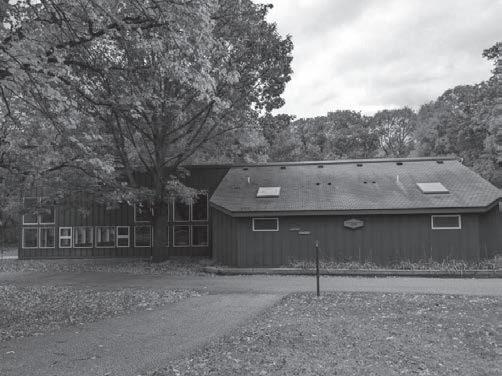
STATE COUNCIL
From page 1
needed places and staff can get paid.
Another need is accessible and affordable housing. A fourth is improved insurance access for people with rare diseases.
A big change sought is a Minnesota Human Rights Act amendment to include “episodic disabilities.” Episodic disabilities are life-long conditions, such as diabetes, cancer and multiple sclerosis for which there is no cure. People who live with these disabilities know that some days are better than others. People living with episodic disabilities experience periods of fluctuating good or poor health and rely
The current pool and gym are more than 50 years old and beyond repair. Existing systems such as water heaters and pool systems are outdated and inefficient. It is difficult to provide people with a quality experience with such old facilities. A new pool would include modern splash pad features, zero-entry for users and more.

In 2022, True Friends made the initial bonding request for $10 million to build the new pool, two gyms and a welcome center at Camp Courage. Phase one of the project has been completed and funded by donors, to determine costs and prepare site
on proper care, monitoring and treatment. The need for this change came up due to a legal case, where the federal Americans with Disabilities Act (ADA) provided support while state law didn’t.


But the second pillar change that has drawn the most focus in recent years is reform of the asset limit for Medical Assistance for Employed People with Disabilities (MA-EPD). Many Minnesotans with disabilities rely on the program for access to health care. Several speakers at the forum said the program is a lifeline and a chance to work and contribute to the community.
But strict income and asset limits perpetuate poverty, as those in the program have to either spend down the few
plans. An environmental phase one audit and site surveys are complete. Corrina Township in Wright County signed on as public entity or fiscal agent.
Unfortunately, no bonding bill was passed in 2022. So the request is being brought back, with hopes that a bonding measure of some sort will be passed this year. It was one of many disability bonding measures left on the table.
“Camp Courage was built on the pretense of being a place that was made for us, and this place is still made for us,” said Billie, a longtime Camp Courage camper.
assets they have or pay high premiums to access Medicaid. People cannot save up to buy housing or a car, and struggle to live independently under such strict rules.
Disability partner support is the state council’s third pillar, with a diverse array of issues to be supported with other entities. One is the Minnesota Inclusive Education Consortium’s effort to open up more college programs to students with intellectual disabilities.

Longstanding efforts to increase state parks’ accessibility will continue with the Minnesota Department of Natural Resources. Another longtime MCD priority is that of transportation improvements, including autonomous vehicles.
“It felt like a piece of heaven to me in the sense that everyone is welcome, everyone is accepted…overall you are accepted. Disability and all.”
The Camp Courage pool and gym project is endorsed by the Camp Cambria Foundation, Camp Sweet Life Juvenile Diabetes Camp, and the U.S. Power Soccer Association. It is on the agenda of items for support from the Minnesota Consortium for Citizens with Disabilities.
To learn more about True Friends and this initiative, contact us at https:// truefriends.org/
The Minnesota Commission of the Deaf, DeafBlind, & Hard of Hearing will get council help with its efforts to make hearing aids more affordable. A Minnesota Department of Administration study of disabled-owned businesses is another support item. So is support for the Minnesota Consortium for Citizens with Disabilities legislative agenda.

Turner said one focus will be seeking additional resources, in light of the state’s record budget surplus, saying there needs to be an effort to get the supports and services Minnesotans with disabilities need.
See the state council’s full list of priorities and the video at https://www. disability.state.mn.us/
said Connye LaCombe.
“When I hear about a resource like this being developed and some of the reaction is ‘we need it, but not here,’ my reaction is we need it so why not here,” said Katie Dohman.
Some of the issues at play: State law requires such facilities to be located in residential areas and requires that cities permit them. The city had no recourse to deny the proposal.
The city supported the location because residential homes are only on one side of the property and don’t immediately back up to
it (the facility and backyards are separated by undeveloped woods). The location also offers easy access to transportation, services at the Northern Government Center, and other nearby amenities.
The city is requiring security cameras, fencing, and city review of intake policies, among other conditions.
West St. Paul Police Chief Brian Sturgeon has repeatedly addressed the security concerns, saying “These people are in our community already, whether they’re in a house or homeless or what have you. But this is a place where they can get off the street, or get away from whatever is causing their crisis situation, get them into a stabilized facility to seek treatment to get a
more permanent stabilization plan in place to help them in the long run. These people are not going to go out and terrorize the community.”
Council Member Wendy Berry said, “The mayor and I are both on the South Metro Fire Board where we’ve been focused so much on the mental health of our firefighters for four years, and I know the chief of police has been really focused on mental health issues there. If we’re not also extending that same accessibility to people in our city, we’re doing ourselves an injustice.”
“When Dakota County built the Northern Service Center this room was packed three times as big with people
against it. And they were so afraid of that building and that there were going to be criminals and people ruining their neighborhood. It just didn’t happen,” said Council Member Dick Vitelli.
Council Member Robyn Gulley added, “For everyone who took the time to come and speak, it matters a lot. Not just for us to hear these stories, which were both heartbreaking and incredibly moving, but also because it helps send a message to people who are coming into our community that this is the kind of community we are, that we are a loving and welcoming and caring community.”
January 2023 Volume 34, Number 1 Pg 4 FROM OUR COMMUNITY
HANDI MEDICAL SUPPLY T MANKATO
CENTER From page 1
Facilities are showing their age.
TRUE F FRIENDS
Invest in pity free, disability journalism. Make your tax-deductible gift today! 651-644-2133 access@accesspress.org
Mechanical systems have aged out.
PEOPLE AND PLACES
NAMI Minnesota elects five new board members at its annual meeting
The National Alliance on Mental Illness (NAMI) Minnesota elected Raquel Arismendez, Napoleon Howell, Jennifer Knapp, Dr. Jazlynn Paige and Meredith Vadis to the organization board during its recent annual meeting.
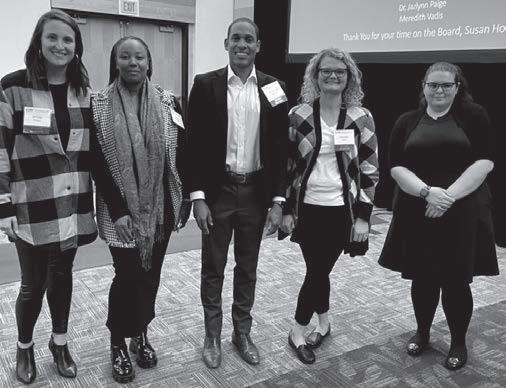
Arismendez is a project manager working with schools and nonprofits that primarily serve young people of color in culturally affirming ways. Having firsthand experience with the barriers queer youth of color face in accessing mental health services, she is passionate about NAMI Minnesota’s mission, both personally and professionally. She hopes to bring not only her lived experiences and her professional background as well to support improving equitable access to mental health services for historically underserved populations.
Howell is a leader within Deloitte Consulting’s strategy practice. He has experienced the devastating impact of overt and covert manifestations of mental illness and seeks to leverage his capabilities to drive the solutioning needed. He is particularly interested in helping lower income communities gain awareness and access to mental health resources.
Knapp works as a program manager for a Fortune 500 company focused on community outreach, strategy, and meeting planning. She has more than 11 years of communications experience in the non-
Living Well Disability Services
honored
The Dakota County Regional Chamber of Commerce has announced the winners for its annual Business Excellence Awards.

The nonprofit of the year is Living Well Disability Services.
Living Well Disability Services began as Dakota’s Children in 1972. Started by parents, volunteers and community partners in West St. Paul, the founders saw a need for longer term care that put people with disabilities, and families that support them.

Many named to state posts
Gov. Tim Walz and Lt. Gov. Peggy Flanagan have recently announced a number of appointments. One new group is the Governor’s Advisory Council on Opioids, Substance Use, and Addiction.
“The Advisory Council, along with the recently appointed Addiction and Recovery Director, will provide valuable insight from a variety of perspectives, including those with lived experiences and those from communities that are disproportionately impacted by addiction,” said Walz. “This partnership will work to ensure that individuals at all stages of recovery, and their families, have a voice to improve access to the resources they need.”
Members are Colin Cash, Onamia; Kyle Christianson, Moorhead; John Donovan, Big Lake; Beth Elstad, Duluth; Pamela Lanhart, Burnsville; Jeffrey Lind, Bemidji; Bobby Marines, Rochester; Anderson Saint Georges, Detroit Lakes; Kimberly Stokes, Britt; William Messinger, Wendy Jones and Fiyyaz Karim, St. Paul, Kate Noffke , St. Paul; and Farhia Budul, LaTricia Tate, Arden Two Bears, Travis Winship and Autumn Dillie, Minneapolis.
Walz signed legislation during the 2022 Legislative Session establishing the role of Addiction and Recovery Director, the Subcabinet on Opioids, Substance Use, and Recovery, and its corresponding Advisory Council. The advisory council will meet to identify opportunities for and barriers to the development and implementation of policies and strategies to expand access to effective services for Minnesotans. The advisory council will also examine services and supports needs and provide opportunities for Minnesotans who have experienced addiction.
Other appointees have also been named recently. James McKinstra, Moorhead, was reappointed to the Minnesota Board on Aging. The Minnesota Board on Aging develops, coordinates, evaluates, and administers federal and state funds for programs for the aging, makes grants to seven area agencies on aging and nonprofit
profit, sports, financial and retail industries. She was formally diagnosed with OCD, general anxiety and depression after the


agencies, and serves as an advocate for older persons.
Dave McAuliffe, North Branch, was reappointed to the Minnesota Commission of the Deaf, DeafBlind, and Hard of Hearing as Metro Advisory Committee representative. The Commission of the Deaf, DeafBlind, and Hard of Hearing serves as the principal agency of the state to advocate on behalf of deaf, deafblind, and hard of hearing Minnesotans by working to ensure those persons have equal access to the services, programs, and opportunities available to others.
Trevor Turner, Minneapolis, was reappointed to the State Rehabilitation Council as a current or former recipient of vocational rehabilitation services. Kyle Van Acker, Ham Lake, was reappointed as Governor’s Workforce Development Board Representative. The State Rehabilitation Council’s duties include guiding decisions about Minnesota’s Vocational Rehabilitation Services (VRS), coordinating between VRS and centers for independent living and other state councils with interest in issues pertaining to disability and employment, and reporting to the governor and the U.S. Department of Education on the status of vocational rehabilitation programs.
Joseph Dailey, Prior Lake, was reappointed to the Statewide Independent Living Council. The Minnesota Statewide Independent Living Council (MNSILC) works collaboratively with the Centers for Independent Living to create, monitor, review, and evaluate the State Plan for Independent Living. MNSILC coordinates activities with other entities in the state that provide services similar or complementary to independent living services.
birth of her second son, just days after the pandemic lockdown. Her desire to be on the NAMI Board stems from wanting to
Angelique Piper of Ramsey and Panou Xiong, Minnetonka, were reappointed to the Ombudsman Committee for Mental Health and Developmental Disabilities
The Ombudsman Committee for Mental Health and Developmental Disabilities advises and assists the ombudsman in developing policies, plans, and programs to benefit persons with mental illness, developmental disabilities, chemical dependence, and emotional disturbance.
impact those struggling to openly share their story or ask for help due to the lingering negative attitudes surrounding mental illnesses.
Paige is the founder of Paige Psychological Consulting with eight years of experience as a school psychologist. She contracts with over ten school districts across Minnesota, providing school psychology services to kindergarten through 12th-grade students. Her expertise includes mental health, trauma, family support, homelessness, suicide prevention, special education equity and relationship building. Her passion fuels her desire to serve on the NAMI Board to improve the lives of her community Board Nominees by changing the attitudes surrounding mental health and providing the tools and resources that families need to be successful in all aspects of their lives.
Vadis is a longtime public servant and current business executive in the occupational health and wellness industry. Mental illnesses are prevalent in her family, and her younger sister recently died by suicide. Her public service background in low-income housing and public transit gives her unique insight into how mental health plays out across many public policy areas, and she looks forward to advancing NAMI’s initiatives at all levels of government.
Oluwagbenga Ogungbe, Oakdale, was reappointed to the Board of the Minnesota State Academies. The Board of the Minnesota State Academies governs the State Academies for the Deaf and Blind. It promotes academic standards based on high expectations and an assessment system to measure academic performance toward the achievement of those standards.
January 2023 Volume 34, Number 1 Pg 5
Albright Townhomes Minneapolis 612-824-6665 1 BR Cornerstone Creek Apartments Golden Valley 763-231-6250 1 & 2 BR (for developmentally disabled individuals) Diamond Hill Townhomes Minneapolis 612-736-9341 2 & 3 BR Elliot Park Apartments Minneapolis 612-338-3106 2 BR Franklin Lane Apartments Anoka 763-427-7650 1 & 2 BR Hanover Townhomes St. Paul 651-292-8497 1 BR Hilltop Manor Eveleth 218-744-5169 1 BR Hopkins Village Apartments Hopkins 952-938-5787 1 & 2 BR Village Apartments Hopkins 952-938-5787 1 & 2 BR Lincoln Place Apartments Mahtomedi 651-653-0640 2 BR Olson Towne Homes Minneapolis 612-377-9015 1 BR Park Plaza Apartments Minneapolis 612-377-3650 1 & 2 BR Prairie Meadows Eden Prairie 952-941-5544 2 & 3 BR Raspberry Ridge Hopkins
1 BR Slater Square Apartments Minneapolis
EFF & 1BR Spirit on Lake
1 & 2 BR Talmage Green Minneapolis
2 BR Trinity Apartments Minneapolis
1 BR (sr) Unity Place Brooklyn Center
2 BR Vadnais Highlands Vadnais Heights
3 BR Visitation Place
1, 2 3 BR Willow Apartments Little Falls
1 BR Woodland Court Apartments Park Rapids
1 BR HOUSING FOR VETERANS AT RISK OF HOMELESSNESS Veteran's East Apartments Minnneapolis
EFF Veteran's & Community Housing Minnneapolis
EFF TRELLIS MANAGEMENT MAY BE ACCEPTING APPLICATIONS for our accessible waiting lists at the following affordable communities: We may be accepting applications for our large number of mobility impaired accessible units. Please call us for more information. Reach our valued readers! Call or Email Today! 651-644-2133 ads@accesspress.org NAMI MINNESOTA
Jennifer Knapp, Dr. Jazlynn Paige, Napoleon Howell, Meredith Vadis and Raquel Arismendez are the new NAMI Minnesota Board members.
952-933-3260
612-340-1264
612-724-3029
612-623-0247
612-721-2252
763-560-7563
651-653-0640
651-647-2550
320-632-0980
888-332-9312
612-208-1712
612-333-0027










January 2023 Volume 34, Number 1 Pg 6 ADVOCACY Advocating Change Together V-651-641-0297 act@selfadvocacy.org www.selfadvocacy.org Cow Tipping Press V -507-521-2278 bboyce@cowtippingpress.org www.cowtippingpress.org Mayor's Advisory Council for People with Disabilities V-651-266-8902 michele.severson@ci.stpaul.mn.us https://bit.ly/stpadvisory MCIL V-651-646-8342 F-651-603-2066 www.mcil-mn.org Mid-Minnesota Legal Aid - MN Disability Law Center V-612-334-5970 mndlc@mylegalaid.org mylegalaid.org/our-work/disability MN Consortium for Citizens with Disabilities V-651-274-2098 info@mnccd.org www.mnccd.org MN Governor's Council on Developmental Disabilities V - 651-274-2098 admin.dd@state.mn.us mn.gov/mnddc SMILES Center for Independent Living V -507-345-7139 smiles@smilescil.org https://smilescil.org Upstream Arts V -612-331-4584 info@upstreamarts.org www.upstreamarts.org/ ASSISTED LIVING Desnol Healthcare Services V-763-210-8684 info@desnolhealthcare.com www.desnolhealthcare.com Opportunity Partners V-952-938-5511 info@opportunities.org www.opportunities.org AUTISM SERVICES ACCORD V-612-224-9101 info@accord.org www.accord.org Accra V-952-935-3515 TF-866-935-3515 www.accracare.org Fraser V 612-861-1688 fraser@fraser.org www.fraser.org LSS Host Homes V-651-255-2363 hosthomes@lssmn.org www.lssmn.org/hosthomes Opportunity Partners V-952-938-5511 info@opportunities.org www.opportunities.org BRAIN INJURY ACCORD V-612-224-9101 info@accord.org www.accord.org LSS Host Homes V-651-255-2363 hosthomes@lssmn.org www.lssmn.org/hosthomes Opportunity Partners V-952-938-5511 info@opportunities.org www.opportunities.org Restart, Inc. V-952-767-3350 viannc@restarticmn.org www.restartincmn.org CASE MANAGEMENT Fraser V 612-861-1688 fraser@fraser.org www.fraser.org CHEMICAL HEALTH Avivo V -612-752-8000 contact@avivomn.org www.avivomn.org COMMUNITY LIVING Fraser V 612-861-1688 fraser@fraser.org www.fraser.org LSS Community Residential Services V-651-642-5990 pss@lssmn.org https://lssmn.org/crs MCIL V-651-646-8342 F-651-603-2066 www.mcil-mn.org Opportunity Partners V-952-938-5511 info@opportunities.org www.opportunities.org Reach for Resources V-952-200-3030 F-952-229-4468 www.reachforresources.org CONSUMER-DIRECTED COMMUNITY SUPPORTS Accra V-952-935-3515 TF-866-935-3515 www.accracare.org EDUCATION Avivo V -612-752-8000 contact@avivomn.org www.avivomn.org Fraser V 612-861-1688 fraser@fraser.org www.fraser.org Upstream Arts V-612-331-4584 info@upstreamarts.org www.upstreamarts.org EMPLOYMENT/VOCATION Avivo V -612-752-8000 contact@avivomn.org www.avivomn.org Courage Kenny Rehabilitation Institute V-612-863-4200 www.allinahealth.org/couragekenny MRCI V-507-386-5656 referrals@mymrci.org www.mymrci.org Opportunity Partners V-952-938-5511 info@opportunities.org www.opportunities.org ProAct V-651-686-0405 aballard@proactinc.org www.proactinc.org Reach for Resources V-952-200-3030 F-952-229-4468 www.reachforresources.org WACOSA V-320-251-0087 info@wacosa.org www.wacosa.org HEARING DISABILITIES Minnesota Commission of the Deaf, DeafBlind & Hard of Hearing (MNCDHH) V-651-431-5961 mncdhh.info@state.mn.us www.mn.gov/deaf-commission INFORMATION/REFERRAL RESOURCES ADA Minnesota; a program within MCIL V-651-603-2015 711 relay service www.adaminnesota.org LEGAL Mid-Minnesota Legal Aid - MN Disability Law Center V-612-334-5970 mndlc@mylegalaid.org mylegalaid.org/our-work/disability ACCESS PRESS DIRECTORY Reach our valued readers! 651-644-2133 Thanks to ALL OF YOU for supporting Access Press BENEFACTOR ($1000 & up) Janice Chevrette Ronna Linroth Brandon Miller Lynda Milne Joel Ulland Kay Willshire MAIL YOUR SPONSORSHIP AND SUBSCRIPTION TO : Access Press, LTD. PO Box 40006, Industrial Station St. Paul, MN 55104-8006 DONATE ONLINE: www.accesspress.org/donate GOLD ($500-$999) Jeff Bangsberg & Anita Boucher Anne L. Henry Kim Kang Steve Kuntz Jim Musselman Debra J. Shriver Robyn Wade Courage Kenny Just Comfort SILVER ($150-$499) Holly Anderson Alexandra Bartolic Dena Belisle Tim Benjamin Gretchen Bratvold Mark Daly Yoshiko S. Dart Anonymous Rosebud Elijah Lee Ann & Dale Erickson Vicki Garrets Robert Gregory Craig Dunn & Candy Hart Pam Hochrein Judy Hunt Brian Musselman Manley Olson Mark W. Traynor & Jen Peterson Julee Quarve-Peterson Hilary and Stuart Ratner Ken Rodgers Ann C Roscoe Walt Seibert Amanda & Mark Tempel BRONZE ($75-$149) Dena Belisle Jesse Bethke-Gomez Gretchen Bratvold Tom Clark Richard Cloud Margot Cross Daniel Ness Dawn R. Doering Dean Doering Craig J. Dunn Anonymous Ellie Emanuel Steve Erbes Kent Fordyce Claudia Fuglie Lael Gatewood Marjorie Goldberg Mike Gude Terry Hagenah Ellen & Skip Houghton Catherine Hunter Kim Keprios Megan Keyser Steve Larson Jane Larson Michelle & John LeBlanc Gene Martinez John Marty Tom & Ky Milne Eric S. Nelson Daniel Ness Annette M. Pantel Mark Payette Ken Rodgers Carrie Salberg Anita & Luther Schermer/Granquist Stephanie Schwartz Jon Skaalen Laurene Tomaszewski Cathy Wick Zekerya Yargici Leslie Zaricor Richard Ziton FRIEND ($50-$74) Nora Aileen Beall Tom Clark Joanna & Richard Cortright Paul Bauer & Pat Cretilli Ellie Emanuel Steve & Jo Ann Erbes Nancy N. Eustis Ann Griffith Phil Jacobsma Dale Jkaniszeski Laura Johnson Barb Kane Mark Knutson Tag Krogseng Sand Lane Kenneth Latkin William & Joan Overby Annette M. Pantel Donn Poll Alina Schroeder Stephanie Schwartz Mike Schwartzbauer Dick VanWagner Linda Wolford • Responsive PCA Services • Independent Living Services • ADA Information • COVID Community Coordination • Transitional and Housing Services • Advocacy and Referral Services Contact us today! 651-646-8342 530 North Robert St, Saint Paul MN 55101 Responsive PCA Choice Services Independent Living Services ADA Information & Referral Covid Community Coordination Transitional and Housing Services Contact us today! www.mcil-mn.org Live your most independent life, follow your path! Live your most independent life, follow your path! Responsive PCA Choice Services Independent Living Services ADA Information & Referral Covid Community Coordination Transitional and Housing Services Contact us today! www.mcil-mn.org 651-646-8342 530 North Robert Street Saint Paul, MN 55101 Live your most independent life, follow your path!
In print four times annually and online 24/7, the Access Press Directory offers quick information for people seeking an array of resources. From housing to health care, recreation to recovery, clubs to consumer-directed community supports, we offer the information you need for your best life!


Just $70 per year gets your listing in front of readers eager for services and supports. Add additional listings for a small fee. Have a business, service provider or organization needing visibility at a low cost? Contact us today! access@accesspress.org 651-644-2133
Are you a current Directory member?


To renew your listing, make updates and add new categories, it’s easy with our credit card system.
With the pandemic, our publication is more important than ever. Thanks to our advertisers for their ongoing commitment to Access Press!
January 2023 Volume 34, Number 1 Pg 7 MEDICAL SUPPLIES/EQUIPMENT Gillette Children's V -651-291-2848 publications@gillettechildrens.com www.gillettechildrens.org Handi Medical Supply V-651-644-9770 F-651-644-0602 www.handimedical.com HME Medical Shop V - 800-258-6313 customerservice@hmemedicalshop.com www.hmemedicalshop.com Numotion V-763-571-9176 chris.simms@numotion.com www.numotion.com MENTAL HEALTH Accra V-952-935-3515 TF-866-935-3515 www.accracare.org Avivo V -612-752-8000 contact@avivomn.org www.avivomn.org ACCORD V-612-362-4400 info@accord.org www.accord.org Fraser V - 612-861-1688 fraser@fraser.org www.fraser.org LSS Host Homes V-651-255-2363 hosthomes@lssmn.org www.lssmn.org/hosthomes National Alliance on Mental Illness (NAMI) V-651-645-2498 TF-888-826-4435 www.namimn.org Reach for Resources V-952-200-3030 F-952-229-4468 www.reachforresources.org MOVIES/PERFORMING ARTS/SPECTATOR Young Dance V-612-423-3064 info@youngdance.org www.youngdance.org RECREATION Courage Kenny Rehabilitation Institute V-612-863-4200 www.allinahealth.org/couragekenny Reach for Resources V-952-200-3030 F-952-229-4468 www.reachforresources.org Wilderness Inquiry V-612-676-9400 info@wildernessinquiry.org www.wildernessinquiry.org RECREATION-HOBBIES/CLUBS/SOCIAL GROUPS Courage Kenny Rehabilitation Institute V-612-863-4200 www.allinahealth.org/couragekenny Reach for Resources V-952-200-3030 F-952-229-4468 www.reachforresources.org RECREATION-TRAVEL/CAMPING Wilderness Inquiry V-612-676-9400 info@wildernessinquiry.org www.wildernessinquiry.org REHABILITATION: PHYSICAL, OCCUPATIONAL, SPEECH, AUDIOLOGY, TECHNOLOGY Courage Kenny Rehabilitation Institute V-612-863-4200 www.allinahealth.org/couragekenny Gillette Children's V -651-291-2848 publications@gillettechildrens.com www.gillettechildrens.org RESIDENTIAL/GROUP HOME PROGRAMS LSS Host Homes V-651-255-2363 hosthomes@lssmn.org www.lssmn.org/hosthomes Opportunity Partners V-952-938-5511 info@opportunities.org www.opportunities.org Restart, Inc. V-952-767-3350 viannc@restarticmn.org www.restartincmn.org SERVICE ANIMALS Helping Paws V - 952-988-9359 info@helpingpaws.org www.helpingpaws.org Pawsitive Perspectives Assistance Dogs (PawPADs) V-612-643-5671 info@pawpads.org www.PawPADS.org SKILLED NURSING FACILITIES ACCORD V-612-362-4400 info@accord.org www.accord.org LSS Host Homes V-651-255-2363 hosthomes@lssmn.org www.lssmn.org/hosthomes SUPPORTS - OTHER TYPES Interact Center for the Visual and Performing Arts V-651-209-3575 advancement@interactcenter.org https://interactcenter.org Highland Friendship Club V-651-340-0711 info@highlandfriendshipclub.org www. highlandfriendshipclub.org Phoenix Alternatives, Inc. (PAI) V-651-846-9274 www.paimn.org TECHNOLOGY Gillette Children's V -651-291-2848 publications@gillettechildrens.com www.gillettechildrens.org VISION IMPAIRMENT Minnesota Commission of the Deaf, DeafBlind & Hard of Hearing (MNCDHH) V-651-431-5961 mncdhh.info@state.mn.us www.mn.gov/deaf-commission WAIVER CASE MANAGEMENT info@accord.org www.accord.org hosthomes@lssmn.org www.lssmn.org/hosthomes jwhite@tunheim.com www.accrahomecare.org F-952-229-4468 www.reachforresources.org ACCESS PRESS DIRECTORY Be
Access
part of a great resource! The best way to reach Minnesota’s disability community is through the
Press Directory
New medical conditions added to program
The Minnesota Department of Health will add irritable bowel syndrome and obsessivecompulsive disorder to the list of qualifying medical conditions for participation in Minnesota’s medical cannabis program. The new qualifying conditions will take effect August 1, 2023.
“We are adding the new qualifying conditions to allow patients more therapy options for conditions that can be debilitating,” said Minnesota Commissioner of Health Jan Malcolm.
Irritable bowel syndrome (IBS) is a disorder characterized by abdominal pain or discomfort, and irregular bowel movements that can result in diarrhea, constipation, both diarrhea and constipation, or bloating. Obsessive-compulsive disorder (OCD) is characterized by recurring, intrusive thoughts that often cause significant emotional distress and anxiety. This can lead to behaviors that the affected person feels compelled to perform to reduce that distress. Research has shown that people who suffer from these conditions can see benefits from using medical cannabis to treat their symptoms.

As in past years, state officials conducted a formal petition process to solicit public input on potential qualifying medical conditions and delivery methods for medical cannabis. Minnesotans submitted petitions in June and July. Following that, the process moved into a public comment period and a review panel.
No petitions for new delivery methods were submitted this year. Petitions for gastroparesis and opioid use disorder were not approved. Gastroparesis, or delayed gastric emptying, was not approved as a qualifying medical because research indicates that cannabis can make the condition worse. As for opioid
Children’s hospital opens new unit
Children’s Minnesota has opened a new in-patient mental health unit in St. Paul this month to meet a surge in demand for mental health care.
“The children’s hospital system with facilities in St. Paul and Minneapolis saw a 30 percent rise in youth mental health crises last year. Leaders there said suicidal ideation has become a top five diagnosis for the first time ever.
It’s a dire moment for kids from a mental health standpoint,” said chief of general pediatrics at Children’s Minnesota, Gigi Chawla.
“We are seeing the largest number ever in our facilities of kids and youth for suicide attempts, for severe depression and anxiety and other mental health crises,” said Children’s CEO Marc Gorelick.
The number of young people dealing with mental health crises has been rising for several years, including rises of 10 percent year over year before the pandemic. But the pandemic compounded already existing issues. And hospital leaders said they didn’t have the space offer young patients the help they needed.
“These kids come in and end up spending days or even weeks in emergency rooms or medical inpatient units, waiting for a psychiatric bed to open up to get the care that they need,” Gorelick said.
The new facility is meant to address those issues with 22 large, private rooms, a design focused on natural light and sensory-friendly spaces, and a multidisciplinary care team.
“Our new in-patient unit will be one of a few such facilities in the state and the country with private patient rooms for every patient that also has space for a patient or a guardian to spend the night with their child,” Chawla said.
Children’s is also partnering with community-based mental health programs, such as Washburn Center for Children. It expanded virtual mental health care options and is planning to open a new outpatient day program for children and teens in Roseville in early 2023.
(Source: Minnesota Public Radio)
Payment diversion is challenged


Many young adults share a common plight. They are among hundreds of former foster youths across Minnesota who are struggling to make ends meet because county agencies took their federal benefits without telling them.
Under a longstanding practice, Minnesota counties are withholding monthly Social Security payments from foster children whose parents have died or have become disabled, and instead are using the money to offset the cost of county foster care. Based on new data,
that students who are affected by snow, mark down their routes to give direction to the snow removal team.
The disability office serves as a place for counseling, advising and advocacy. Students are asked to address any issues that come up regarding their ability to move around campus and complete their assignments. But for people with disabilities and those who don’t drive, that practice can be limiting.
One year-round issue the office is working is placement of elevators.
Elevators are in every academic building. however, there is only one elevator in any of the campus housing options. Although this is one of their big concerns, office staff and student activists would like elevators added in the dormitories when other improvements are made.
(Source:
The Concordian, Moorhead)
ERA passage could help all rights
use disorder, the health department heard from medical and mental health providers who recommended against approving opioid use disorder as a qualifying medical condition due to lack of evidence for its effectiveness and the availability of FDA-approved medications for treatment.
Under state rules, patients certified for new qualifying medical conditions will become eligible to enroll in the state’s medical cannabis program on July 1, 2023, and receive medical cannabis from either of the state’s two medical cannabis manufacturers starting Aug. 1, 2023. As with other qualifying conditions, patients need advance certification from a participating Minnesota health care provider.
child advocacy groups estimate that each year between $6 million to $10 million in federal payments are being taken from some 1,400 foster youths statewide.
From Mankato to Duluth, former foster youth said they feel betrayed and abandoned by the county welfare agencies charged with protecting them. Most said they were never told of the benefits and learned about them only by chance years after their parents died. The money, which averages about $700 a month, could have been a crucial lifeline — helping them pay for rent, tuition, transportation, therapy and other expenses as they transition to adulthood.
An emerging coalition of foster youth, child welfare advocates and civil rights attorneys is pushing to end the practice — saying it’s tantamount to theft and exacerbates the economic hardships that many foster youths face. A bill to be introduced at the capitol would preserve these funds for youths by placing them in individual trust accounts, which foster children could access when they turn 18. The legislation is modeled after similar laws in Connecticut, Hawaii, Nebraska and Texas, as well as Philadelphia and the District of Columbia.
“It’s theft, plain and simple,” said Hoang Murphy, executive director of Foster Advocates, a St. Paul-based nonprofit that has been lobbying to end the practice.
“How can these agencies say they are serving children while they are taking the very money that would help them make a start in life?”
In Minnesota, as in most states, local agencies routinely gain control over a child’s Social Security survivor and disability benefits by applying to be their financial representatives (known as “representative payees”) with the federal Social Security
(Source: Minnesota Department of Health)
Administration. Federal law requires these financial representatives to act in the best interests of the foster children, yet the money is frequently taken without foster youths ever knowing it. In 2018 alone, local child welfare agencies took more than $165 million in Social Security benefits owed to foster youth, according to a national survey by Child Trends, a Washington, D.C., research group.
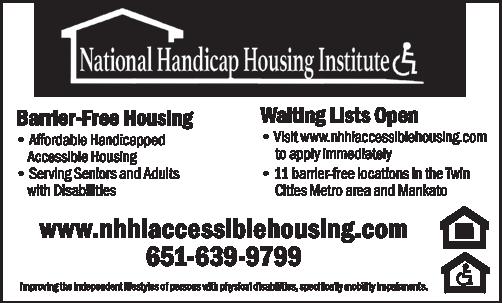
In Hennepin County, home to the state’s largest population of foster children, the revenue from the benefits is significant. From 2019 to 2021, Hennepin collected nearly $1.5 million in survivor and disability benefits from foster children, which is used to offset the cost of their care. Each year, 100 to 150 foster youth in Hennepin are eligible for benefits, which represents less than 12 percent of the county’s population of youths in out-ofhome care, according to county data.
(Source: Star Tribune)
College students raise access concerns
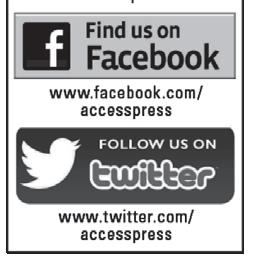
Concordia College, Moorhead, is its most dangerous in the winter. Ice goes everywhere it doesn’t belong; on roadways heading to Fargo, on sidewalks students use for classes, and on-ramps that can be potentially dangerous for wheelchair users.
Student Abigail Vogeler is a cofounder of the club, Sonder. Sonder is a club for disability and mental health advocacy. Vogeler believes that there is a big need for accessibility everywhere. “Oftentimes, accessibility and accommodations are an afterthought,” she said. More students are talking about the issues this winter.
Winters with heavy snowfall are common in the Fargo-Moorhead area, and those can be isolating for everyone at the college. Before the snow falls every year, disabilities services staff sends out a request

The morning after the 2022 election, Betty Folliard held an executive meeting of the group ERA Minnesota in her home. The meeting was part celebration, part call to action. The midterms swept Democrats into complete control of Minnesota government. Folliard, a former state lawmaker, sees that as a chance to secure more rights in the state Constitution.
“People woke up to the idea that, ‘oh, I see laws are fickle.’ Even federal laws and statutes and rules are fickle. They come and go with the prevailing political winds,” said Folliard. “This was critical for people to understand because we’ve been saying it for years.”
Folliard has been pushing for years to pass the Equal Rights Amendment in Minnesota, which would add language to the Constitution that says equal rights cannot be denied on account of gender. Despite a 1972 vote in the U.S. House and Senate to pass the Equal Rights Amendment, not enough states voted to ratify it by the deadline in 1982. Now neither the U.S. nor the Minnesota constitution has an amendment addressing gender equality.
The ERA’s supporters argue it would apply a more rigid standard of legal scrutiny in cases involving gender discrimination, but it’s failed to gain traction in the divided Legislature. Both chambers must approve a constitutional amendment in order to get it on the ballot.
In the state of Nevada, voters overwhelmingly voted to pass their own version of the Equal Rights Amendment that went further than most, prohibiting the infringement of rights based on “race, color, creed, sex, sexual orientation, gender identity or expression, age, disability, ancestry or national origin.”
The Nevada language will be introduced in Minnesota in 2023. The group is also drafting a federal resolution. Folliard said a vote must happen this year because her organization needs all the time it can get to campaign statewide to pass the amendment on the 2024 ballot. In Minnesota, a nonvote for a constitutional amendment counts as a “no” vote.
(Source: Star Tribune)
January 2023 Volume 34, Number 1 Pg 8
REGIONAL NEWS
REGIONAL NEWS To page 9
His family led group home work
Stephen Lawrence Johnson’s parents saw a need for housing for people with disabilities, and helped found Hiawatha Homes in the Rochester area. Johnson died at home recently of natural causes. He was 55 and lived in Rochester.
The son of Janet and Larry Johnson, Stephen was born with several disabilities. His parents were motivated to work with three other families and area organizations to found Hiawatha Homes, to provide housing for people with special needs. Steve was one of the first residents and lived in various Hiawatha Homes for 46 years.
He participated in a number of physical activities at PossAbilities, outings to sporting events and Hiawatha staff softball games. He attended the Winnebago youth camp for several years and greatly enjoyed riding an adult tricycle in summer months. He also loved listening to country-western music.
He is survived by his parents, brothers and their families, and aunts and an uncle. Services have been held. Memorials go to Hiawatha Homes Foundation, PossAbilities or ARC Minnesota Southeast Region.
He worked on Minnesota Relay
Jim Alan Schroedermeier transitioned from a successful broadcast career to working on the Minnesota Relay Service. Schroedermeier died this fall. He was 66 and lived in St. Paul.
Minnesota Relay is a free, federally mandated Telecommunications Relay Services program that allows individuals who are deaf, deafblind, hard of hearing or have speech disabilities to place and receive telephone calls.
Schroedermeier won awards as a broadcast journalist for local and national stations, including work at KYMN in Northfield and WJON in St. Cloud.
He spent 12 years as a public policy planner and strategist for the Minnesota Department of Public Service. As assistant commissioner for telecommunications, he put contracts, buildings, and personnel in place to run the Minnesota Relay. He retired from state government and enjoyed the great outdoors.
He is survived by his mother, sisters and their families. Services have been held. Memorials preferred to Union Gospel Mission or donor’s choice.
REGIONAL NEWS
From page 1
Another city enacts assessment delays
An update to the city of Le Sueur's assessment policy will allow residents with disabilities, residents older than age 65, and owners of sub-dividable residential lots to request a deferment of payments on special assessments.

The change in policy was recently approved by the Le Sueur City Council, amendment, brings back deferment options on the basis of hardship that were previously included in city policy.
Under the amendment, residents 65 years or older and property owners retired due to disability may be eligible to seek a deferment on payments owed to the city as a result of benefits accrued from infrastructure improvements. Interest on these assessments will continue to be charged at the same rate as other benefitting properties. Payment on that interest will be postponed until the deferment is ended.
The full assessment and interest will come due in any of the following four scenarios: if the property owner requests to end the deferment; if a property owner 65 or older dies and the surviving owner is ineligible for a deferral; if any part of the property is sold, transferred or subdivided or if the property loses its homestead status.

"An individual who was going to be assessed would state the reason for hardship and the city could then approve or deny those applications. That language went away in the last policy," said City Administrator Joe Roby.
(Source:
the many ways that Minnesotans with disabilities could enjoy the great outdoors. Accommodations are available for a wide range of disabilities and at many parks and recreation areas throughout the state.
Radio host Moon was the emcee and the event featured many special guests. The ADA was 32 year old in 2022 and Minnesota’s celebration was one of many held around the nation.
The groundbreaking Partners in Policymaking Program celebrated 35 years of work with self-advocates, with a reunion and anniversary event that drew a large crowd. One feature of the event was the display “Inclusion.” The Partners program also celebrated the graduation of another classes and announced that it would take applications for 2022-2023.
Metro Mobility and its clients were dealing with the challenge of service reductions throughout the system.
MOHR honored direct support providers who make a positive difference in the lives of their clients. Lynn Megan was feted with the “Tip of the Spear” Award for her work in advancing MOHR’s efforts. Megan is president and CEO of TSE, Inc. and a longtime MOHR board member and volunteer.
Longtime WACOSA employee Nancy Betts was named executive director of the disability service organization.
Can Do Canines was training another group of service dogs to fly with their people on commercial airlines, using a flight simulator.
August 2022
Longtime Access Press Executive Director Tim Benjamin was mourned after his death. He was remembered as someone dedicated to shining a light on issues affecting Minnesota’s disability community. He also championed the rights of people with disabilities and used his own experiences to make key points. He was one of the first Minnesota journalists to shed light on the direct support staffing crisis. Benjamin had worked at Access Press for more than two decades. He was 69 and lived in Arden Hills.
His death saddened those who had followed his health challenges since 2019, and had cheered on his progress.
“Tim Benjamin was a real asset to the disability community,” said Access Press Board Chairman Joel Ulland. “He had an ability to connect with everyone he met and use the power of the newspaper to make positive changes for people with disabilities. He will be missed.”
Another sad loss was that of Mike “Chevy” Chevrette, who championed employment issues and wrote travel guides for people with disabilities. The Michigan native was an active community volunteer including service on the Access Press Board.
Planning ahead was urged, to make the Minnesota State Fair a more enjoyable experience for people with disabilities and their family and friends. Minnesota State Fair Accessibility Services offers many services for fairgoers with disabilities. Access Press worked with fair staff to print the annual disability dining guide.
Gummies and chews were rolled out as the latest additions to the state’s medical cannabis program.
September 2022
After almost six years, a lengthy class action lawsuit was coming to an end. The lawsuit, centered on living choice, should allow more than 1,000 Minnesotans to move out of group homes and into community settings. A preliminary settlement was announced by the Minnesota Disability Law Center. The case goes back to federal court this month.
Getting to know guardianship was part of a series of articles Access Press presented on voting and voter rights for people with disabilities. Guardianship is one of the most complex issues people with disabilities face. The series was sponsored by the Minnesota Council on Nonprofits.
50-year anniversary celebration. The North Shore disability service agency had gone through many changes over the years.
Sen. David Tomassoni was one of many community figures who had died. Tomassoni, a veteran iron Range legislator, died after a battle with ALS. Wheelchair racer and activist Gary Weber was remembered for his advocacy and his work to promote wheelchair racing. Bruce Ario used his experiences with mental illness and traumatic brain injury to advocate for himself and many others. Benjamin “Benny” James was a well-liked reader for Radio Talking Book.
October 2022
Moving disabled people out of subminimum wage work and into better-paying jobs is the goal of an $10.5 million initiative. State grants to service providers throughout Minnesota will help people earn competitive wages and ultimately, live more independently.
Funding was approved by the Minnesota Legislature in 2021 and was allocated by the Minnesota Department of Human Services (DHS). Provider Reinvention Grants went to 22 employment services providers. The University of Minnesota’s Institute on Community Integration received funding to provide statewide technical assistance, engaging with job seekers and their families, and helping providers with training and toolkits.
Seven Minnesota human services organizations were recognized for their commitment to providing housing, economic assistance, food, health care and other essential services to the state’s residents. The first award presentation was to Housing Matters in Bemidji, for its work to address the community’s growing housing crisis. Housing Matters’ mission is for every disabled person experiencing long-term homelessness to have a stable living environment in the community of their choosing, whether living alone or with family members. The group was a winners of the Commissioner’s Circle of Excellence Awards from the Minnesota Department of Human Services.
Access Press was preparing its new and improved website, highlighted by a presentation by disability community activist Belo Cipriani.

November 2022
Disability advocacy organizations and their allies were putting the finishing touches on legislative proposals. Much focus will likely be on issues around the state’s support staff shortage.
Advocates will be back with an array of familiar asks, including higher wages, the ability for staff to be compensated for driving time, overtime pay, training and more. Competitive wages continue to be worrisome.
But looming over all were questions about the makeup of the 2023 legislature and state offices. All were on the ballot, and with retirements the capitol was facing one of its greatest changeovers in decades.
Le Sueur County News)
The Minnesota Council on Disability paid tribute to its outstanding advocates, including legislators and dedicated community volunteers.
The Lake County DAC held a delayed
Vision Loss Resources’ move to its new home brought back memories of the early groups that supported services for the blind and those with other visual disabilities. The Mutual Aid Blind Association of St. Paul, founded by the city’s Council of Jewish Women, became an independent group 100 years ago.
St. Paul’s Hamm Clinic unveiled new office space.
December 2022
Northfield-based Laura Baker Services celebrated 125 years of making life better for people with disabilities. Originally the Laura Baker School, it changed with the times to provide services for people with disabilities in that part of the state. It is said her spirit is still at the organization’s headquarters.
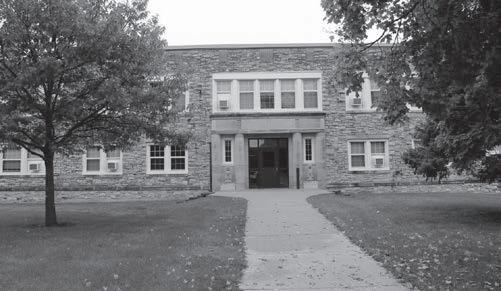
Jan Malcolm was stepping down as Minnesota Commissioner of Health. Her service and leadership, especially during the COVID-19 pandemic, would be missed. She is also saluted for her long service to Minnesotans with disabilities.
Deafblind Poet John Lee Clark announced another publication of his work, the book How to Communicate.
Renae Oillette, who had recently retired from Lakeville Public Schools, was honored for her many years of service in special education. The group, Minnesota Administrator for Special Education, gave her an award for outstanding leadership.
NAMI Minnesota presented its annual awards to people who had a positive impact in the state’s mental health community.
January 2023 Volume 34, Number 1 Pg 9
f In Memoriam f
For your FREE estimate, call 800-649-5215 651-399-3075 Learn more at amramp.com
one
a time. • Low cost • FREE home evaluations • Rent or buy • Installed in days
Changing our customers’s lives,
ramp at
From page 3 FILE PHOTO
“It is important that our
clients
who struggle with stairs are able to maintain their freedom, dependence and community ties.”
YEAR IN REVIEW
State academy buildings were one 2022 bonding focus..
RADIO TALKING BOOK
New year, new books
Radio Talking Book is excited to start 2023 with 20 new books premiering. Only one book will be rebroadcast this month. Staff invite listeners to suggest new books, by going to www.mnssb.org/rtb
Use an app to hear programs
Radio Talking Book is not just for listeners with visual disabilities. Anyone with difficulty reading or turning pages can enjoy the service.
Enjoy programming on a hand-held mobile device, for either iOS or Android. Visit the Apple App Store for iOS, or Google Play for Android, and download the Minnesota Radio Talking Book app.

Listen to RTB’s live or archived programs online at www.mnssb.org/rtb Books broadcast on the Minnesota Radio Talking Book Network are available for loan through the Minnesota Braille and Talking Book Library in Faribault. The catalog is at www.mnbtbl.org, click on the link Search the Library Catalog. Call the Minnesota Braille and Talking Book Library at 800722-0550, Mon-Fri, 9 am - 4 pm CST.
For more news, go to the Facebook site Minnesota Radio Talking Book.
Audio information about the daily book listings is on the National Federation for the Blind (NFB) Newsline. Register for NFB Newsline by calling 651-539-1424.
The NFB-NEWSLINE service provides access to more than 500 magazines and newspapers. To learn more, visit www.nfb. org/programs-services/nfb-newsline.
Donate to the State Services for the Blind at mn.gov/deed/ssbdonate
The sampling published monthly in Access Press doesn’t represent the full array of programming.
Chautauqua*
Monday – Friday 6 a.m.
Opioid Reckoning, nonfiction by Amy Sullivan, 2021. A captivating look at the complexity and the humanity of the opioid epidemic. Read by Carl Voss. 12 broadcasts; begins Tue, Jan. 10. – L
How the World Really Works, nonfiction by Vaclav Smil, 2022. An essential analysis of
the modern science and technology that makes our 21st century lives possible—a scientist's investigation into what science really does, and does not, accomplish. Read by Jack Rossmann. 15 broadcasts; begins Thu, Jan. 26.
Past is Prologue*
Monday – Friday 11 a.m.
Crown & Sceptre, nonfiction by Tracy Borman, 2022. A sweeping narrative of the British monarchy illuminating one of history’s most iconic and enduring legacies. Read by John Holden. 22 broadcasts; begins Wed, Jan. 4.
Bookworm*
Monday – Friday 12 p.m.
Theatre of Marvels, fiction by Lianna Dillsworth, 2022. A riveting journey across Victorian London and an unforgettable tale of race, identity and a woman’s reclamation of her fate. Read by Brenda Powell. 12 broadcasts; begins Wed, January 4.
Olav Audunssøn 1: Vows, fiction by Sigrid Undset, 2020. The initial volume in the Nobel Prize–winning author’s tumultuous, epic story of medieval Norway—the first new English translation in nearly a century. Read by Don Lee. 15 broadcasts; begins Mon, Jan. 23.
The Writer’s Voice*
Monday – Friday 1 p.m.
Seven Aunts, nonfiction by Staci Lola Drouillard, 2022. Part memoir, part cultural history, these memories of seven aunts holding home and family together tell a crucial, often overlooked story of women of the 20th century. Read by Carol McPherson. 15 broadcasts; begins Wed, Jan. 11. – L
Choice Reading*
Monday – Friday 2 p.m.
Carnival Lights, fiction by Chris Stark 2021. A novel ranging from reverie to nightmare and back again in a lyrical yet unflinching story of an Ojibwe family’s struggle to hold onto their land, their culture and each other. Read by Andrea Bell. 12 broadcasts; begins Mon, Jan. 16. – L
Afternoon Report*
Monday – Friday 4 p.m.
A Brief History of Equality, nonfiction by Thomas Piketty, 2022. The world’s leading
Greater Twin Cities, Paul, $180,000. The network will expand to reach older adults with accessible, affordable whole-person mental health care.
economist of inequality presents a short but sweeping and surprisingly optimistic history of human progress toward equality despite crises, disasters, and backsliding. Read by Stevie Ray. 11 broadcasts; begins Wed, Jan. 18.
Night Journey*
Monday – Friday 7 p.m.
Something Wicked, fiction by David Housewright, 2022. A hardboiled mystery about a retired detective who gets talked into doing an old friend a favor involving a castle, a family fighting over an inheritance, and at least one mysterious death. Read by Pat Kovel-Jarboe. 10 broadcasts; begins Mon, Jan. 9. – L
One-Shot Harry, fiction by Gary Phillips, 2022. Armed with his wits, his camera, and occasionally his Colt .45, “One-Shot” Harry plunges headfirst into the seamy underbelly of 1963 Los Angeles. Read by John Gunter. Nine broadcasts; begins Mon, Jan. 23. – L, S
Off the Shelf*
Monday – Friday 8 p.m.
Home Or Away, fiction by Kathleen West, 2022. A story about overcoming our pasts, confronting our futures, and the sustaining bonds of female friendship. Read by Michele Potts. 11 broadcasts; begins Mon, Jan. 2. – L, S
The Sisters Mao, fiction by Gavin McCrea, 2022. Against the backdrop of China’s Cultural Revolution and Europe’s sexual revolution, the fates of two families in London and Beijing become unexpectedly intertwined. Read by Therese Murray. 19 broadcasts; begins Tue, Jan. 17. – L, S, R
Potpourri*
Monday – Friday 9 p.m.
Rogues, nonfiction by Patrick Radden Keefe, 2022. An enthralling and deeply human portrait of criminals and rascals, as well as those who stand up against them. Read by Dan Sadoff. 18 broadcasts; begins Thu, Jan. 5. – L, V, G
Good Night Owl*
Monday – Friday 10 p.m.
The Marylebone Drop (rebroadcast), fiction by Mick Herron, 2018. A retired British Intelligence operative stumbles across an event that proves to be both suspicious and
transportation to medical appointments, grocery shopping, caregiver respite, exercise classes and social interactions.
All times listed are Central Standard Time.
Abbreviations V – violent content R –racial epithets L – strong language S –sexual situation G – gory descriptions
deadly. Read by John Beal. 3 broadcasts; begins Tue, Jan. 3. – V
Undiscovered Country, fiction by Lin Enger, 2020. A bold reinvention of Shakespeare’s Hamlet and a hair-bristling story of betrayal, revenge, and the possibilities of forgiveness. Read by John Schmidt. Nine broadcasts; begins Mon, Jan. 9.
The Barrens, fiction by Kurt Johnson & Ellie Johnson, 2022. This riveting debut is at once a white-water adventure, comingof-age novel, and tale of tragic love. Read by Jodi Lindskog. Nine broadcasts; begins Mon, Jan. 23. – L, S, G
RTB After Hours*
Monday – Friday 11 p.m.
Part of Your World, fiction by Abby Jimenez, 2022. A charming story of an unlikely smalltown romance between a surgeon and a carpenter. Read by Michelle Juntunen. 13 broadcasts; begins Thu, Jan 5. – L, S
To Marry and to Meddle, fiction by Martha Waters, 2022. An ingenious, laugh-out-loud and sweepingly romantic historical rom-com about a seasoned debutante and a rakish theater owner as they navigate a complicated marriage of convenience. Read by Holly Sylvester. 11 broadcasts; begins Tue, Jan. 24. – S
Weekend Program Books
Your Personal World, 1 p.m. Sat. presents Inspired by Matt Richtel, read by Beverly Burchett.
For the Younger Set, 1 a.m. Sun. presents The Ogress and the Orphans by Kelly Barnhill, read by Pat Muir.
Poetic Reflections, noon Sun, presents The Only Worlds We Know by Michael Lee, read by Jim Ahrens, followed by The More Extravagant Feast by Leah Naomi Green, read by Mary Knatterud.
The Great North, 4 p.m. Sun, presents The View from Split Rock by Lee Radzak, read by Karen Ray; followed by The Pride of Minnesota by Thom Henninger, read by Jim Gregorich.
will expand critical chore and homemaking services in Wright and Sherburne counties.
activities of daily living, respite care, meals, exercise classes and more.
Pelican Rapids OAKS Living at Home Network, Pelican Rapids, $52,000. OAKS will strengthen existing services, dedicating more time to health, wellness and isolation, and enhancing caregiver and companion support services.
Southern Minnesota Family Service Rochester, Rochester, $187,000. Neighbors Helping Neighbors will provide culturally appropriate communitybased services in Olmsted and Rice counties, helping more than 900 residents live better in their homes and communities. Outreach will focus on Black, Indigenous and people of color, low-income, rural and veteran elders.
Southwestern Minnesota Opportunity Council, Worthington, $145,000. The Age Safely at Home program provides financial assistance and project management for home modifications such as ramps and bathroom remodeling. The work will reach 20 low-income households.
La Crescent Area Healthy Community Partnership, La Crescent, $60,000. Neighbors in Action offers services for atrisk seniors, including veterans, LBGTQ+ and culturally and racially diverse people throughout Houston County.

Rebuilding Together Twin Cities 2 – for Pipestone County services, Minneapolis, $98,000. Services will expand to Pipestone County in southwestern Minnesota, with accessibility modifications for 23 senior homeowners and 50 Safe at Home kits.
Twin Cities
Amherst H. Wilder Foundation, Paul, $52,000. The project will improve access to home and community-based services for Southeast Asian older adults living in St. Paul public housing, in a culturally focused way.
Anthony Park Area Seniors, St. Paul, $60,000. Services delivered through a block nurse program will be expanded.
North-End-South Como Block Nurse Program, Paul, $50,000. Wellness and health promotion activities will support healthy lifestyles and reduce isolation and loneliness.
Faith Community Nurse Network of the
Como Park Living at Home Block Nurse Program, Paul, $60,000. The program provides a wide range of services and supports.
Cerenity Senior Care-Humboldt, Paul, $293,000. The assisted living facility for extremely low-income seniors will be renovated and modernized.
Jewish Family Service, Paul, $125,000. The program will expand and improve access to cultural communities and a wider group of older adults and caregivers.
Vietnamese Social Services of Minnesota, Paul, $132,000. The Healthy & Joyful Elders Circle fights depression and isolation faced by many refugee elders through a variety of services.
Twin Cities Habitat for Humanity, Paul, $125,000. Home modifications will help older, low-to-very-low-income residents remain safely in their homes longer, with a focus on serving more homeowners of color.
Hamline Midway Living at Home/Block Nurse Program, Paul, $57,000. Serving the diverse St. Paul neighborhoods of Hamline-Midway and Frogtown, Hamline Midway Elders will continue work with older adults and volunteers to provide services that support older adults living in their own homes.
East Side Neighborhood Services, Minneapolis, $251,000. Programming will help older adults better understand mental health issues, better manage chronic conditions, prevent falls, maintain independence and increase community connection.
Minneapolis American Indian Center, Minneapolis, $128,000. The organization will add in-home supportive services for Native elders, including homemaker/chore services, home safety assessments and modifications to prevent falls.
Lao Advancement Organization of America, Minneapolis, $52,000. LAOA will provide assistance to ethnic Lao caregivers and recruit volunteers to provide in-home respite care, with a goal of serving 25 ethnic Lao seniors with respite care.
Nokomis Healthy Seniors Program, Minneapolis, $60,000. The program organizes volunteers to provide
Rebuilding Together Twin Cities, Minneapolis, $151,000. More low-income older adults will receive home accessibility modifications. Outreach to veterans Black, Indigenous and people of color will increase, with a focus on Native American residents.
Longfellow/Seward Healthy Seniors Program, Minneapolis, $60,000. Outreach to Somali elders in the greater Longfellow area of south Minneapolis will increase, with a Solos Resource Group for older adults who don’t have traditional family support networks.
Metro Meals on Wheels, Minneapolis, $96,000. The program will create a mobile app to improve communication with seniors and caregivers, with a focus on diverse communities.
Korean Service Center, Minneapolis, $185,000. The program helps Korean immigrant older adults live well at home through services including transportation, virtual visit care service, caregiver support services and bedside care.
Southeast Seniors, Minneapolis, $60,000. Services include companionship, in-home nursing on a sliding fee scale, service coordination, transportation, chore services, grocery shopping, intergenerational programs, health promotion activities and caregiver support.
Pillsbury United Communities, Minneapolis, $136,000. Elderly East African Minnesotans will receive support to continue living healthy and connected lives in their homes. East African seniors are disproportionately impacted by health disparities including chronic diseases, mental illness, and social isolation.
Apparent Plan, Eden Prairie, $63,000. START Senior Solutions will expand care coordination services to serve 80 older adults and family caregivers, and add service areas in Anoka and Big Stone counties.
Cerenity Senior Care, White Bear Lake, $350,000. The 43-unit building will make interior renovations to make units accessible and meet accessibility requirements.
Senior Community Services, Minnetonka, $96,000. With a target population of low or moderate-income older adults at risk of moving into long-term care, the program
DARTS, West St. Paul, $69,000. DARTS will expand respite and home services, which improve quality of life for older adults. The organization will also establish and operate an affordable group respite program, expanding home services into Dakota County.
CAPI USA, Brooklyn Center, $86,000. The Hmong Seniors program provides culturally appropriate support to enable independent community living for more than 100 low-income Hmong seniors. Programs include case management, caregiver support, benefits enrollment support, community gardening, home food delivery, volunteer companionships and more.
Ebenezer Society Foundation, Edina, $207,000. M Health Fairview and Ebenezer Society renovated St. Joseph’s Hospital in St. Paul to create the Fairview Community Health and Wellness Hub. Ebenezer’s adult day care services will serve approximately 100 older adults.
Scott, Carver and Dakota Community Action Partnership, Shakopee and Rosemount, $36,000. CHORE programming and activities for aging adults will be expanded. Relationships will be with more community-based service providers.
January 2023 Volume 34, Number 1 Pg 10
NEW GRANTS
page 3 Reach our valued readers! Call or Email Today! 651-644-2133 ads@accesspress.org
From
Save the date for gala
Can Do Canines hosts its annual Fetching Ball Gala on Sat, Feb. 25. This year’s event will be held at the Radisson Blu Mall of America, with KARE 11 Reporter/ Anchor Rena Sarigianopoulos serving as emcee. Enjoy an evening that celebrates
Children and families
PACER workshops sampling
PACER Center offers many useful free or low-cost workshops and other resources for families of children with any disabilities. Some in-person workshops are offered. Other workshops are online and livestreamed at this time. Advance registration is required for all workshops. At least 48 hours’ notice is needed for interpretation. Check out PACER’s website and link to the newsletter of statewide workshops that allows participants to pick and choose sessions designed for their needs.
Video Game Access : Part One: Xbox/PC is 1-2:15 p.m. Wed, Jan 25 online. In this part one of Video Game Access, learn about devices, software, and accessibility features specific to gaming with Xbox or PC.
Video game Access Part Two: PS4/PS5 is 1-2:15 p.m. Wed, Feb. 8 online. In part two of Video Game Access, you'll learn about devices, software, and accessibility
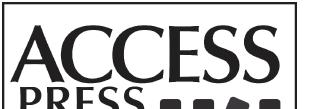
the amazing human-assistance dog teams of Can Do Canines. Enjoy dinner, inspiring stories, games, and silent and live auctions–all benefitting the organization. Tickets now available. FFI: candocanines. org/fetchingball
Art shanties to return
Art Shanty Projects return to the ice of Bdé Umá /Lake Harriet in South Minneapolis with a diverse and accessible outdoor program. The program offerings this year include 18 shanties (15 of them new) and more than 20 rotating performance groups. Many projects are movement-based, which helps keep both audiences and artists warm outside. The opening weekend features a new contemporary skating performance from American Ice Theatre. Wear a snowsuit for weekly yoga, also known as fro-gahhh: yoga for the planet and the people, or the weekly dance parties on Sundays (Pollinator Frenzy). The festival closes out with community games from Twin Cities Native Lacrosse (Thakápsičapi).
The Art Shanty Projects On-Ice program will take place on Bdé Umáŋ / Lake Harriet from Jan. 21 through Feb. 12. Public hours are 10 a.m. - 4pm every Sat and Sun. Kicksleds are available as mobility aids. There will be ASL interpreters and audio describers available daily from 11 a.m. – 2 p.m. More specific accessibility information can be found online. There will be a suggested donation of $10-20 at the gate again this season. FFI: http:// www.artshantyprojects.org/

Open Flow Forum
The Artists with Disabilities Alliance meets via Zoom 7-9 p.m. the first Thu of the month. Upcoming dates are Jan. 5 and Feb. 2. Virtually join artists with disabilities and supporters to share visual art, writing, music, theater and artistic efforts or
disability concerns. Facilitators are Tara Innmon, Kip Shane and Springboard for the Arts. The gatherings are fully accessible. Anyone needing special accommodations should contact Andy Sturdevant at host organization Springboard for the Arts. Funding is available for access needs. FFI: 651-294-0907, resources@ springboardforthearts.org
Resources to Enjoy!
The Enjoy listings are for arts events as well as banquets, fundraisers and fun events by and for disability services organizations. Schedules may be subject to change. Some venues still may have mask and vaccine requirements. Please check with a venue or organization before making plans.
The Minnesota Access Alliance (MNAA) provides an Accessible Arts & Culture Calendar for arts patrons who use accessibility accommodations such as audio description, captioning, ASL interpreting and sensory-friendly accommodations. Link to more details at https://calendar.mnaccess.org. Be sure to check the listing or venue to find out its COVID-19 protocol and if an advance reservation is needed for the accessibility service.
Accessible events can be submitted to the MNAA Calendar (and MinnesotaPlaylist. com). A list of other venues follows the event listings.
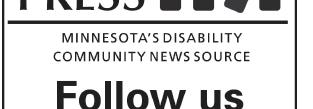
To receive a free monthly events calendar: email mactfactor@icloud.com and/or info@mnaccess.org. Ask for the entire events list or specific lists for ASL interpreting, captioning, audio description, sensory-friendly accommodations or disability-related topics.
For other accessibility resources or upcoming webinars presented by MNAA, sign up for emails at https://mnaccess.org
features specific to gaming with PS4/PS5.


Video Game Access : Part Three: Switch/Virtual Reality is 1-2:15 p.m. Wed, Feb. 22 online. In this part three of Video Game Access, learn about devices, software, and accessibility features specific to gaming with Switch/Virtual Reality. FFI: PACER, 952-838-9000, 800537-2237, www.pacer.org
Info & Assistance
Help with insulin
Minnesota’s Insulin Safety Net Program provides a pathway to access the life-saving drug. Don’t ration insulin, reduce doses or delay purchases to save money. MNsure and the Minnesota Board of Pharmacy remind Minnesotans that the program provides fast, reliable help for those who need insulin and may be struggling to afford this life-saving drug. The program can help eligible Minnesotans who have less than a seven-day insulin supply, with an immediate 30-day supply. Pay no more
than a $35 co-pay, one time per year. Or, longer-term help to pay for insulin can be provided.
In 2021, over 1,100 Minnesotans received discounts on their insulin through the program, totaling nearly $6.9 million, but many more are likely eligible for assistance. In 2020, the Minnesota Department of Health estimated that 8.8 percent of adults in Minnesota (about 390,000) had been diagnosed with either Type 1 or Type 2 diabetes, with more than 20,000 new cases diagnosed each year. FFI: https:// www.mninsulin.org/
Many classes available
NAMI Minnesota (National Alliance on Mental Illness) has set up a wide variety of free and in-person online mental health classes. Choices include Hope for Recovery, Transitions, Ending the Silence, Understanding Early Episode Psychosis for Families, In Our Own Voice, Family to Family, Positive Psychology, Creating Caring Communities, smoking cessation,
a suicide prevention class called QPR –Question, Persuade and Refer, a special QPR class for Agricultural Communities and many more.
Be aware that on Feb. 1, NAMI Minnesota’s Online Support Groups move to a new and improved platform, HeyPeers. HeyPeers provides a safe, easy to access environment exclusively designed for online support group meetings.
The classes and online support groups are designed for family members and caregivers, persons living with a mental illness, service providers, and also the general public. Find a complete listing of these classes and how to join in by going to namimn.org and clicking on “Classes” or go straight to https://namimn.org/ education-public-awareness/classes/ scheduled/
Dewey Place/The Pines Foley 320-968-7791 Highwood Homes Prior Lake 952-447-6961 Greenwood Wadena 218-631-2575 Mission Oaks Plymouth 763-559-5770
Rustic Creek Two Harbors 218-595-1018
Todd 27 Long Prairie 320-732-6154
Town Square East Grand Forks 218-773-3631
Victory Duluth 218-722-2629
Income and rent restrictions apply Metes & Bounds is an equal housing opportunity housing company
January 2023 Volume 34, Number 1 Pg 11
ENJOY !
OPPORTUNITIES Expand YOUR REACH Connect with our valued readers today Call today & learn how! 651-644-2133 ext. 2 ads@accesspress.org Classified rates: $20 (first 12 words); $1/word beyond 12. Email classified to access@accesspress.org Deadline: 20th of each month. We will email total cost of classified ad. FIND YOUR NEW HOME WITH AT HOME APARTMENTS Call 651-224-1234 or visit AtHomeApartments.com for an apartment or town home Equal Opportunity Housing METES & BOUNDS MANAGEMENT Company manages the following Section 8 properties in Minnesota: Boardwalk Wayzata 952-473-0502
CLASSIFIEDS FOR RENT FOR SALE Modular aluminum ramps -paid $1000, want $500 New Quantum power chair $2000 or best offer 651-772-2502."
Affordable Senior Apartments




•
•



January 2023 Volume 34, Number 1 Pg 12 www.accessiblespace.org Accessible, Affordable Housing Accessible Space, Inc. Call 800-466-7722 TTY/TDD 800-627-3529 • For adults with qualifying disabilities.
Over 50 barrier-free apartment communities & homes throughout the Metropolitan Area, Greater Minnesota and the Midwest.
Locations also available in many other states. Income limits apply.
Immediate openings in Hibbing, Willmar and Hibbing, Minnesota
•
•
•
For qualifying senior households age 62 or better.
•
Metro & Greater MN locations available. Income limits apply.
Accessible apartments, available for seniors in these locations.
Immediate openings in Worthington and Albert Lea, Minnesota Housing with Care* • 24-hour Assisted Living Services • Independent Living Services • Resident Community Setting (Adult Foster Care) • Eligibility for or selection of ASI services is not required to qualify for housing. ASI services are not available in all locations Services openings. Call Today! ACCEPTING IMMEDIATE INTAKES Call: 800-829-7110 or Visit: MRCICDS.ORG Financial Management Service (FMS) | PCA Choice 245D Licensed | Community First Services and Supports (CFSS) MRCI Client Directed Services helps you get the most out of your self-directed care program by assisting you with Human Resources for your staff, paying bills, purchasing goods, managing your care budget, and more so that you can spend your time how you want. Spend your Day Your Way “I know that you guys are there, you’re going to help, you’re going to do it right and you know what you’re talking about.” – Linda W. | Client Representative | Ironton, MN Accessible Space AmRamp ADA Minnesota Americorps/AmPact Artistry Theater and Visual Arts City of Minneapolis CommonBond Communities Disability Hub Fresh Eye Gallery Gillette Children's Handi Medical Hennepin County Hennepin Health Minnesota Housing Finance Agency/Olmstead Minnesota Regional Arts Council Minnesota Council on Disability Mitchell Hamline College of Law MCIL MnSure MRCI NuMotion NHHI Trellis True Friends UCare Vinland National Center Want to join us? Email access@accesspress.org or call 651-644-2133. Print and online options available! Thank you Advertisers Thanks to those who bring you Access Press! Heartfelt thanks to our advertisers who bring you, our readers, Access Press in print and online! Without their support, our newspaper and website would not be possible. Please thank our advertisers for bringing you Minnesota’s disability news source.
•



 by Kevin D. Hendricks West St. Paul Reader
by Kevin D. Hendricks West St. Paul Reader







 By True Friends
By True Friends






























